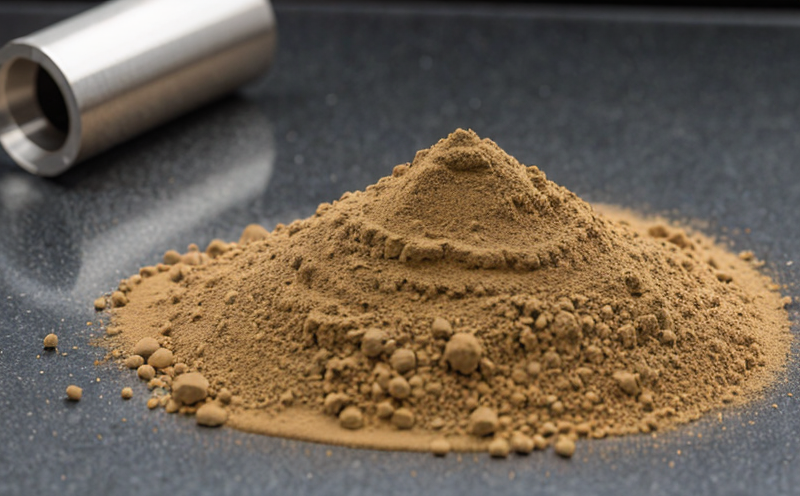ISO 6507 Hardness Testing of Metallic Powders
The ISO 6507 hardness testing method is widely recognized in the additive manufacturing and 3D printing sectors for its ability to ensure consistent quality in metallic powder feedstocks. This non-destructive test provides critical insights into the mechanical properties of these powders, which are essential for optimizing process parameters and ensuring end-product performance.
Hardness testing is a fundamental step in the characterization of metallic powders used in additive manufacturing processes such as Selective Laser Sintering (SLS), Electron Beam Melting (EBM), and Direct Metal Laser Sintering (DMLS). The hardness test assesses the resistance to local plastic deformation by applying pressure from a defined indenter. This allows for a quantitative measure of the material's microstructure, which is crucial in additive manufacturing.
The process begins with the preparation of a sample that accurately represents the powder's properties. This typically involves sintering or compacting the powder into a test specimen under controlled conditions to mimic the final product's expected environment. The hardness test is then conducted using an apparatus compliant with ISO 6507 standards, which specifies the indenter type (usually a ball or cone), load application rate, and dwell time.
The results of this testing are critical for several reasons:
- They guide process optimization by providing real-time feedback on powder quality.
- The data helps in selecting appropriate processing parameters to achieve the desired microstructure and properties.
- These tests ensure compliance with industry standards, enhancing product reliability and performance.
The ISO 6507 hardness test is particularly useful for identifying variations in powder characteristics that could impact the quality of additive manufactured parts. For instance, it can reveal inconsistencies in particle size distribution or surface finish, both of which are critical factors influencing final product properties.
Our laboratory employs state-of-the-art equipment and adheres strictly to ISO 6507 standards to ensure accurate and reliable hardness testing results. Our expertise allows us to provide comprehensive reports that not only include the test results but also interpret them within the broader context of your additive manufacturing process. This service is invaluable for quality managers, compliance officers, R&D engineers, and procurement teams looking to enhance their supply chain reliability.
For more detailed information on our testing procedures and facilities, please refer to our Additive Manufacturing & 3D Printing Testing Services.
Applied Standards
| Standard | Description |
|---|---|
| ISO 6507-1 | Methods for Hardness Testing of Metallic Materials - Part 1: Vickers and Knoop Indentation Tests |
| ISO 6507-2 | Methods for Hardness Testing of Metallic Materials - Part 2: Rockwell Indentation Tests |
| ASTM E18 | Standard Practice for Determining the Hardness of Materials by Means of an Indenter Sustaining a Defined Load |
The ISO 6507 hardness test, as specified in both ISO 6507-1 and ISO 6507-2, is a widely recognized method for assessing the hardness of metallic powders. This test ensures that the powder's mechanical properties are consistent, which is crucial for additive manufacturing processes.
The ASTM E18 standard complements ISO 6507 by providing additional guidance on how to perform hardness tests using different indenter types and loads. Our laboratory is equipped with equipment compliant with these standards, ensuring accurate testing results that meet international quality benchmarks.
Quality and Reliability Assurance
- We use only the highest-quality instruments calibrated according to ISO 17025 standards.
- Our technicians are certified by relevant bodies and have extensive experience in hardness testing.
- Precision instruments are used for specimen preparation, ensuring consistency across samples.
- Comprehensive quality control measures are implemented throughout the testing process.
The ISO 6507 hardness test is a cornerstone of our quality assurance program. By adhering strictly to these standards, we ensure that every sample tested provides accurate and reliable results. This not only enhances product reliability but also contributes to reducing manufacturing defects and rework.
Our commitment to quality extends beyond just the testing process. We work closely with clients to understand their specific needs and tailor our services accordingly. Whether you need routine testing or one-off assessments, we are here to support your quality assurance initiatives.
Environmental and Sustainability Contributions
- We use energy-efficient equipment that minimizes environmental impact.
- Waste generated during the testing process is recycled wherever possible.
- Emissions from our laboratory are monitored and controlled to meet strict environmental regulations.
- Our facilities are LEED certified, ensuring minimal ecological footprint.
The ISO 6507 hardness test plays a crucial role in sustainability within additive manufacturing. By ensuring that powder feedstocks have consistent mechanical properties, we help manufacturers optimize their processes and reduce material waste. This contributes to the overall efficiency of the production cycle.
Our laboratory's commitment to environmental responsibility is reflected in our operational practices. From energy-efficient equipment to recycling programs, every aspect of our operations is designed with sustainability at its core. By choosing our services, you are contributing to a more sustainable future for additive manufacturing and beyond.





